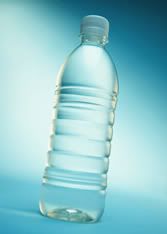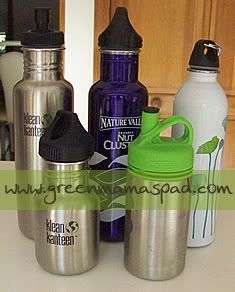 I never quite understood why we pay for something we can get for little to no money right from your kitchen tap. It just seems like a complete waste of money to me. According to Ideal Bite, the average cost of tap water is $0.0015 per gallon. In contrast, a 16-oz bottle of water can cost up to $2.00 at the convenience store. Are we really paying more for water than we are gasoline? (Gasoline is $2.67/gallon here). Doesn't this seem ridiculous to anyone else?
I never quite understood why we pay for something we can get for little to no money right from your kitchen tap. It just seems like a complete waste of money to me. According to Ideal Bite, the average cost of tap water is $0.0015 per gallon. In contrast, a 16-oz bottle of water can cost up to $2.00 at the convenience store. Are we really paying more for water than we are gasoline? (Gasoline is $2.67/gallon here). Doesn't this seem ridiculous to anyone else?
Let's forget the whole money aspect for a few minutes, maybe you have the extra money to spend on water. But what about the environmental impact of all those water bottles? Take a look at this:
~ Americans consume more than 2.5 million bottles of water every hour, and only around 15% are recycled. YIKES!
~ Bottled water produces up to 1.5 million tons of plastic waste per year. Again, only a small percentage are actually recycled.
~ 1.5 million barrels of oil are used every year to manufacture disposable plastic water bottles for the U.S. market. That is enough energy to power 250,000 homes or fuel 100,000 cars for a year.
So between the high cost and the environmental impact, doesn't that make you want to at least cut back on your bottled water consumption? If you said yes, then here are some easy things you can do. Get yourself a good reuabale water bottle. I prefer stainless steel ones but if you opt for plastic, at least make sure it is BPA-free and Phthalate free. Once you have your bottle, fill it up at home before you leave the house. It is as simple as that.
Wait, you don't like the taste of tap water? I don't either. We  have well water which is OK but I hate the taste of municipal water - it tastes like chlorine. Or maybe you are concerned about what is in the tap water? No problem! We are fortunate that our refrigerator has a PUR water filter that filters the water for both our water and ice. So I just fill up my bottles from the fridge. If you don't have that, there are other filtration items you can buy. Both PUR and Brita make water pitchers with filters that you can keep in your fridge as well as filters you can attach to your kitchen faucet. We used to have both of these before we bought our refrigerator a few years ago. They worked great and the faucet one was really nice because I could also filter water I cooked with. (I miss that). There are even water bottles out there with filters on them.
have well water which is OK but I hate the taste of municipal water - it tastes like chlorine. Or maybe you are concerned about what is in the tap water? No problem! We are fortunate that our refrigerator has a PUR water filter that filters the water for both our water and ice. So I just fill up my bottles from the fridge. If you don't have that, there are other filtration items you can buy. Both PUR and Brita make water pitchers with filters that you can keep in your fridge as well as filters you can attach to your kitchen faucet. We used to have both of these before we bought our refrigerator a few years ago. They worked great and the faucet one was really nice because I could also filter water I cooked with. (I miss that). There are even water bottles out there with filters on them.
I've accumulated a small collection of stainless steel bottles over the last 2 years, as you can see in the above picture. I love them all. There are so many out there to choose from. You can check out my EarthLust review that I did earlier this year. For a wide selection of bottles, you can visit reusablebags.com which is where I bought our Klean Kanteen bottles.
And if you are up for it, sign the Take Back The Tap Pledge and commit yourself to reducing your bottled water usage!
Tuesday, September 29, 2009
Going Green: Ditch the Bottled Water
Subscribe to:
Post Comments (Atom)














It's really amazing how many bottles of water are being thrown out. For those of us with reusable bottles, what do you recommend as the best way to wash them out without a dishwasher?
ReplyDeleteExcellent question! I know Klean Kanteen recommends either rinsing with warm, soapy water or using diluted vinegar. If you hate the smell of vinegar, then just use an eco-friendly dish soap and warm water. I use this with a sponge and it works well. Then I let them sit upside down on a dish rack to completely dry out.
ReplyDeleteFor the larger bottles that you may not be able to reach all the way into with your hand and sponge, you can use a bottle brush. I actually need to get one of these. :)
Except that PUR and brita filters don't filter out many of the things that are filtered out of Aquafina and other brands that use reverse osmosis filtration. Sure it tastes and smells fine, but it is full of chemicals that we can't taste or smell. Of course you can buy a reverse osmosis (RO) filtration system for your sink--much more expensive than a brita or another carbon-filer, but much cheaper than bottled water. I don't support the bottled water industry or the overuse of plastic either, but I hate for people to be misled that carbon filtered water is just as good as RO purified water.
ReplyDeleteI am not going to pretend to know anything about Reverse Osmosis, because I don't. But here is some information I just found, RO does not get out everything. And since many bottled water companies get their water from municipal sources, I think its important to note that RO does not remove chlorine or VOCs.
ReplyDeleteAs with anything, you have to way the pros and cons for you and your family and make an educated decision on what will work best for you.
From: http://www.allaboutwater.org/reverse-osmosis.html
Reverse osmosis is a valuable water purification process when mineral-free water is the desired end product. Most mineral constituents of water are physically larger than water molecules. Thus, they are trapped by the semi-permeable membrane and removed from drinking water when filtered through a reverse osmosis system. Such minerals include salt, lead, manganese, iron, and calcium. Reverse osmosis will also remove some chemical components of drinking water, including the dangerous municipal additive fluoride.
Although reverse osmosis does extract several contaminants from drinking water, its removal capabilities are not ideally suited to the challenges of the municipally treated water that the overwhelming majority of people receive. Municipal water contains such contaminants as chlorine and volatile organic chemicals (VOCs). Because these contaminants are physically smaller in size than water, the semi-permeable membrane cannot prohibit them from passing through with the water. Thus, they remain in drinking water.
Reverse osmosis, also, by removing alkaline mineral constituents of water, produces acidic water. Acidic water can be dangerous to the body system, causing calcium and other essential minerals to be stripped from bones and teeth in order to neutralize its acidity. Trace elements of minerals were intended to be in water; their removal leaves tasteless, unhealthy drinking water.
Reverse osmosis, although it is less wasteful than distillation, is still an incredibly inefficient process. On average, the reverse osmosis process wastes three gallons of water for every one gallon of purified water it produces.
I use a reusable water bottle. I have for years. It's by Trudeau: http://www.trudeaucorp.com/us/products/hydration/p-cool-down-087226.html It was about $10 at Target and I love it. Plus it's 24 oz. doesn't leak and has a 5 year unconditional warranty. I even got one for my 4 year old daughter.
ReplyDeleteI was reusing my plastic water bottles long before anyone was saying anything. When it died, i went and bought a new one at the liquor store. LOL
And yes, Ro doesn't get out everything. Neither does carbon filtering. I am not sure there is any system in place that can produce truly PURE water. I think Martyna was a bit harsh in her response.
Have you seen the backpacks from Dante Beatrix? They look like a regular backpack, bu they are made from 7 recycled bottles! How cool is that!? Askmelissa.com is giving away one of the backpacks and and a whole table full of eco-friendly products geared towards moms. Enter the giveaway for free at www.askmelissa.com/eco_moms
ReplyDeleteWe use Klean Kanteen also!
ReplyDeleteI ditched the water bottle about 4 months ago! We bought a Brita filter and we not only save money, but on waste too.
ReplyDeleteMommygaga.com